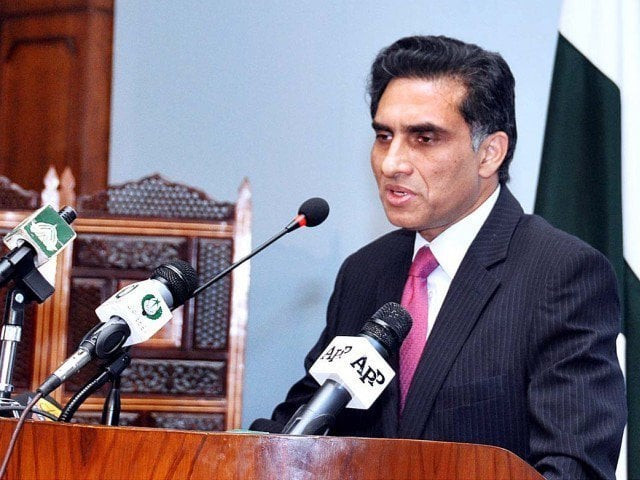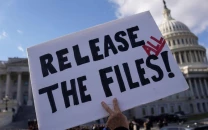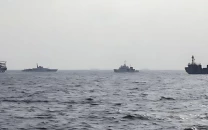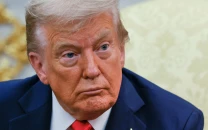US confident of Pakistan's ability to safeguard nuclear weapons
Pakistan stresses the need for access to peaceful nuclear technology as a socioeconomic imperative

PHOTO: APP
During the seventh round of the US-Pakistan Security, Strategic Stability, and Nonproliferation (SSS&NP) Working Group in Washington on Tuesday, US Under Secretary of State for Arms Control and International Security Rose Gottemoeller met with Pakistan Foreign Secretary Aizaz Ahmad Chaudhry. The SSS&NP is a working group under the auspices of the US-Pakistan Strategic Dialogue.
According to a joint statement released on Wednesday, both delegations had a productive exchange of views on issues of mutual importance, including international efforts to enhance nuclear security, peaceful applications of nuclear energy, non-proliferation, export controls, regional stability and security.
Read: Pakistan,US to hold strategic dialogue in Jan: FO
The US delegation welcomed Pakistan's efforts to harmonise its strategic trade controls with those of the Nuclear Suppliers Group and other multilateral export control regimes. Both sides emphasised the desirability of continued outreach to integrate Pakistan into the international non-proliferation regime.
Pakistan stressed the need for access to peaceful nuclear technology as a socioeconomic imperative.
US expressed full confidence in Pakistan's indigenous efforts to strengthen nuclear security, and welcomed Pakistan's efforts to strengthen export controls and border security including through installation of radiation portal monitors at border crossings, as well as Pakistan's hosting of IAEA training activities at its Nuclear Security Center of Excellence.
Read: Talks open Monday: Nawaz visit to White House expected
The Pakistan delegation welcomed the understanding reached between the Islamic Republic of Iran and P5+1 on April 2, underscored the importance of resolving the nuclear issue peacefully, and expressed its earnest hope that the parties concerned will be able to finalise a comprehensive settlement.
Meanwhile, the US underscored its continued efforts to realise the agenda set forth in President Obama's 2009 Prague speech, including the importance of commencing negotiation of a Fissile Material Cutoff Treaty (FMCT) in the Conference on Disarmament (CD), noting its readiness to address all issues raised in the course of negotiations, as allowed for in CD 1299.
Pakistan, however, underlined its preference for a broader Fissile Material Treaty (FMT) that addresses the asymmetries in existing stocks and highlighted that Pakistan's position on FMT will be determined by its national security interests and the objectives of strategic stability in South Asia.
Both sides noted the high priority that arms control has for the international community. The US outlined its nuclear stockpile reductions, explained its efforts to seek congressional approval to ratify the Comprehensive Nuclear-Test-Ban Treaty (CTBT), and reaffirmed its commitment not to conduct further nuclear test explosions.
Pakistan reiterated its support for CTBT-related resolutions in the UN General Assembly, and its consistent stance that it will not be the first in its region to resume nuclear testing.
Reaffirming the prime minister’s 2014 statement in the General Assembly, Pakistan reiterated its longstanding proposal of pursuing nuclear restraint, conventional equilibrium and conflict resolution in South Asia.
Read: Secured nuclear arsenal
Pakistan also echoed its commitment to Credible Minimum Deterrence and to pursue measures in the region aimed at building confidence and lessening the risk of armed conflict.
Both sides also discussed international efforts aimed at improving nuclear security with a central role of IAEA including through the high level focus by the Nuclear Security Summit process and the Global Initiative to Combat Nuclear Terrorism.
Representatives of both the countries also took note of the entry into force of the Arms Trade Treaty. The delegations discussed issues related to the Chemical Weapons Convention (CWC) and the Biological Weapons Convention (BWC) and would continue such consultations.

1721969212-0/BeFunky-collage]-(35)1721969212-0-208x130.webp)

















COMMENTS
Comments are moderated and generally will be posted if they are on-topic and not abusive.
For more information, please see our Comments FAQ